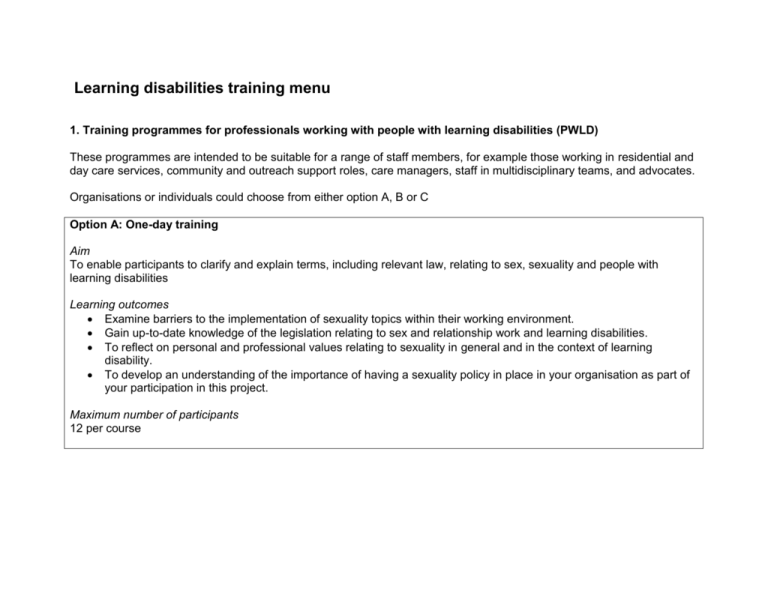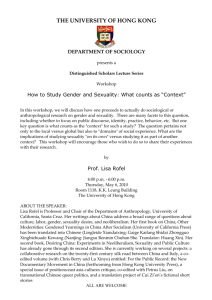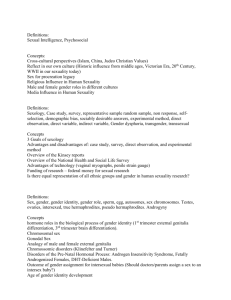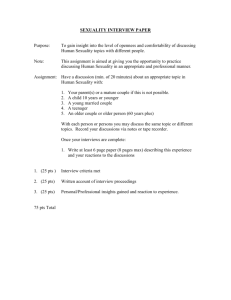learning disabilities training menu
advertisement

Learning disabilities training menu 1. Training programmes for professionals working with people with learning disabilities (PWLD) These programmes are intended to be suitable for a range of staff members, for example those working in residential and day care services, community and outreach support roles, care managers, staff in multidisciplinary teams, and advocates. Organisations or individuals could choose from either option A, B or C Option A: One-day training Aim To enable participants to clarify and explain terms, including relevant law, relating to sex, sexuality and people with learning disabilities Learning outcomes Examine barriers to the implementation of sexuality topics within their working environment. Gain up-to-date knowledge of the legislation relating to sex and relationship work and learning disabilities. To reflect on personal and professional values relating to sexuality in general and in the context of learning disability. To develop an understanding of the importance of having a sexuality policy in place in your organisation as part of your participation in this project. Maximum number of participants 12 per course Option B: Two-day training Aim To enable participants to become increasingly confident in their use of appropriate language when discussing topics concerning sex and sexuality with people with learning disabilities and begin to explore how to structure a programme of sex and relationships work for a group or an individual with learning disabilities (in addition to aim for Option A). Learning outcomes (in addiction to those for Option A plus) Know how to integrate issues of sex, sexuality and relationships into Person-Centred Planning meetings and documentation and Health Action Plans. Know how to include topics concerning sex, sexuality and relationships into sexuality education and training programmes for people with learning disabilities. Know how to select relevant topics and organise them into sessions which create a cohesive programme for their own organisations. Examine a range of resources which can be used in sessions. Explore effective methods which can be used when delivering sessions. Maximum number of participants 12 per course Option C: Three-day training Aim To enable participants to plan, deliver and evaluate a sex, sexuality and relationships programme suitable for people with learning disabilities within own organisation (in addition to aims for Options A and B). Learning outcomes (in addiction of those in Options A and B plus ) Know how to identify need, design, deliver and evaluation sessions. Know how to identify need, design and deliver a sex, sexuality and relationships programme within own organisation. Know how to evaluate the impact of programmes on the lives of the service users they support. Maximum number of participants 12 per course Option D: “On the job” training This option is available for staff who have complete the three-day training (Option C) Aim To provide mentoring and practical support to participants who will be delivering programmes (either 12 group sessions or 10 individual sessions) to people with learning disabilities and enable them to create a tailored resource pack that can be used for current and future work. Learning outcomes Develop and record session plans, evaluating outcomes against what happened in the session. Develop skills in delivering sessions as the programme progresses by taking increasing responsibilities for session delivery Design and create a tailored resource pack for the programme, including sessions plans and educational resources, which will part of the legacy of this “on the job” training. 2. Training programmes for people with learning disabilities (PWLD) The main idea behind these training programmes will be that, following the initial enquiry, the service user concerned will complete accessible application and assessment forms with staff support to create a personalised programme. Ideally, the FPA trainer should meet the participants to introduce themselves before the programme starts. Option E: Individual training programme Ten sessions of 45 minutes each. The programme plan, delivered by an FPA trainer, will be based on assessment of needs identified by PWLD. This programme requires another professional involved in the sessions with 2 options: 1. Professional known to the PWLD and who has completed “on the job” training to create a legacy programme by creating a folder with session plans and resources for future use. 2 Professional who is key working the PWLD will support them during the sessions but will not be expected to create a legacy folder. Learning Objectives in option F Option F: Group training programme Twelve sessions of 60 minutes each. This programme can be delivered to mixed or single gender groups with a minimum of 4 and a maximum of 6 participants who need to share similar levels of cognitive abilities identified by support professionals (for example support workers, psychologists, occupational therapists). Programmes are based on the same assessment form as individual clients. Requires another professional involved in the sessions with the same 2 options as in individual training (Option E). Intended learning outcomes Understand safeguarding concepts relating to sex and relationships (private/public, good/bad touch, saying yes/no). Understand how to use condoms and where to access them. Know about sexually transmitted infections and what support they need to prevent and/or cope with STIs, including places they can access for advice about sexual health. Understand about different types of relationships. Know about different methods of contraception. Maximum number of participants 6 3. Training programmes for parents and carers of PWLD Organisations working with parents and carers can choose from options G, H or I. Option G: Information and signposting sessions A session for parents and carers lasting two hours. Aim To provide parents and carers with information about what educational and sexual health resources are available that they can use with their children, and what is available to support them in terms of local policy and local information. Learning outcomes Understand the wider sex, sexual health and relationships project. Know about resources (educational, clinics, social events, protection, local and national support organisations) Know about the Adult Personal and Sexual Relationships providers’ policy. Option H: One-day training for parents and carers Aim To enable parents and carers to gain confidence and skills in dealing with issues of sex, sexuality and relationships with their children. Learning outcomes Know the barriers that may prevent them from discussing topics around sex, sexuality and relationships with their children. Know some of the legislation relating to sexuality and learning disability. Examine their personal values relating to sexuality in general and in the context of learning disability. Know about the sexuality policy in place locally and how this can help them in their role as parents and carers. Maximum number of participants 12 Option I: Two-day training for parents and carers Aim To enable parents and carers to gain confidence in using language about sexuality with their children and how they can support the development of their children’s sexuality using different approaches and resources (in addition to aim for Option H). Learning outcomes (in addition to those in option H) Understand how to use language about sexuality which meets the needs of PWLD. Understand how to discuss issues of sexuality in Person-Centred Planning and Health Action Plan meetings. Know some resources that they could use when educating their children on sex and relationships topics. Maximum number of participants 12 LD TRAINING MENU STAFF/ Professionals PWLD Type of programme Number of days/sessions Duration Number of participants Selection criteria Group 1 or 2 or 3 days Negotiable 12 Staff working With PWLD Individual “On the job” training 10 PWLD Individual sessions 45 min 1 Completion of 3 day group training 12 PWLD group sessions 1 hour 1 Group 12 1 hour 6 participants + 1 staff member Individual 10 45 minutes Assessment of needs and application . Assessment of needs and appication 1 participant+1 staff member PARENTS/ CARERS Information sessions. 1 2 hours 12 Parent /carer of PWLD Group training 1 or 2 days negotiable 12 Parent/carer of PWLD








